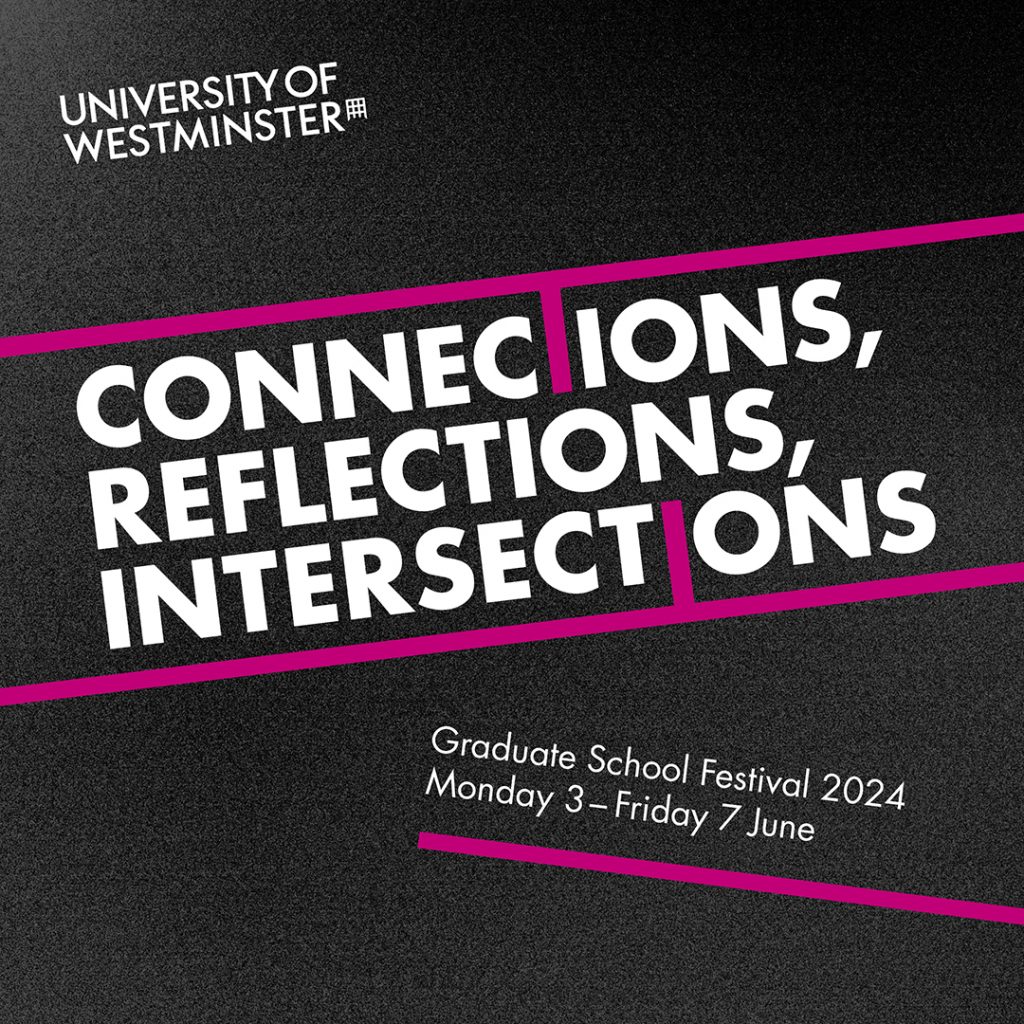Researchers in Conversation
Researchers in Conversation
Symposium
Friday 7 June 2024
11am-5pm
Room 3.07, Little Titchfield Street
Researchers in Conversation brings doctoral researchers across the University of Westminster together in conversation with each other.
Doctoral researchers present a short paper each about their research followed by a conversation. The aim is to bring researchers based across different schools together in dialogue to explore the converging interests and themes arising from their presentations.
Refreshments will be available throughout the day, and lunch will be provided to everyone in attendance.
Programme
Abstracts
Margaret Go: Evaluating Representations of China’s Rise in United States Foreign Policy Context from 1949-2023
China has emerged as the most important partner and rival to the United States. Within the field of IR two main positions, namely neorealism and neoliberal institutionalism, have competing interpretations of China’s rise into a dichotomy of either threat or opportunity, with the former predicting a future of zero-sum conflict and the latter predicting a positive-sum cooperation for both nation-states. My thesis problematizes the tendency to categorise China’s rise into a dichotomy of either-or threat/opportunity while overlooking vital divergences between different types of threats and opportunities on different occasions. By critiquing Rationalist assumptions through a poststructuralist approach inspired by Jutta Weldes, Roxanne Doty and David Campbell, I aim to challenge the binary portrayal of the discourse on China’s rise debate in Western IR literature by examining the impact of such framing on United States foreign policy outcomes, through my the main research question ‘what and how do differing interpretations/representations of China’s rise influence United States foreign policy towards China over time?’
Xuda Wang: Is Nye out of date? Re-examining Soft Power Concept and Chinese Practices
Soft power has become a topic of major international debate. Of particular importance is Nye’s soft power concept and its relation to “China’s soft power”. It has been a mobilising point for new debates that critique the original concept. The pivotal question is not just about defining soft power but also the extent to which China’s international influence can be called soft power, and how to evaluate soft power in the era of digital platforms. Firstly, the presentation will review soft power controversies from the three dimensions of definition, attributes, and evaluation. This part summarises the latest status of soft power research through a systematic review of the literature in recent years. Secondly, the presentation will discuss China’s soft power practice from four perspectives: higher education interaction, media communication, cultural output, and economic attraction, according to the “resource-behaviour-outcome” soft power linear process. The third part of the presentation will combine the theoretical review of the first part and the Chinese practice in the second part to discuss and further elaborate on the research gaps that have not been considered in soft power research in recent years. The “soft power pipelines” and “the multidimensionality and complexity of soft power behaviours” will be the focus of this section. Finally, the author will dialectically answer the question “Is Nye out of date?” in the title and conclusively criticise the insufficiency of soft power and its significant theoretical influence in the discussion of international relations in the era of digital communication using platforms. The focus will be on how TikTok can be implicated in a more nuanced discussion of soft power with Chinese characteristics.
Soph Harris: “Colonialism as Sex”: The Complexities of Fetishisation in Online Spaces in Billy-Ray Belcourt’s A History of My Brief Body and Joshua Whitehead’s Jonny Appleseed
Despite the success of the works of Two-Spirit writer’s Billy-Ray Belcourt (Cree) and Joshua Whitehead (Oji-Cree), there is yet to be an analysis of the complexities of fetishisation in online spaces in Belcourt’s genre crossing essay collection/memoir A History of My Brief Body (2020) and Whitehead’s debut novel Jonny Appleseed (2019). In this presentation I will do just this, discussing how Settler Colonial affects, such as harmful stereotypes, racialisation, and fetishisation, shape the experience of Indigiqueer people online. By paying particular attention to dating apps such as Grindr and OKCupid, I will address the portrayal of sex as performance and how this performativity coincides with fetishisation for the Indigiqueer characters and lives in question in these creative and semi-autobiographical texts. The place of the erotic in contemporary emerging Indigenous writing is key to this presentation and, by analysing Belcourt and Whitehead’s presentations of sex with other Indigiqueer people, will highlight how erotic encounters have the power to decolonise, bring about joy, and forge connections. Though negative associations and experiences of sex – such as sexual assault, fetishisation, and the pathologisation of gay sex – are central to understanding the experience of Indigiqueer people under the structure of Settler Colonialism in Canada, my presentation will show that sex is more than this and that it can be used to manifest a reality where Indigiqueer people are seen as proponents of joy in the face of their traumas; not defined by them.
Akma Nazar: Reimagining The Gendered Mappila Home: Mappila women’s speculations on challenging power structures in the contested home
The common representation of ‘home’ in popular discourse as a sacred, celebratory space of security and maximum individual autonomy is reductive, masculinist and underplays the extent to which home can be considered a contested site of conflict and a locus of power relations (Sibley, 1995; Blunt & Dowling, 2006). Set against the backdrop of the Mappila community (a subculture of Muslims residing in the southwestern Indian state of Kerala) and focusing on the (spatial) agency of Mappila women, my research attempts to unpack how the gendered spatial programs of Mappila homes affect power structures and identity construction. This will lead to an exploration of the possibility of reimagining the Mappila home as a more democratic, gender-equitable space without compromising on the religious faith and religiosity of Mappila women. The emphasis here will be on the agency of Mappila women, with the architect/designer/researcher simply facilitating the articulation of Mappila women’s design aspirations through the chosen methodology. My theoretical framework combines postcolonial feminism and intersectionality (Bartels et al., 2019) to address the interconnectedness of gender, religion, class and often age as the multiple axes in the subjugation of Mappila women. The study will be informed by a hybrid methodology combining qualitative feminist ethnographic methods with conventional architectural research tools such as mapping and archival research. This will include relational autoethnography, which recognizes and values the relationship of the self with others, and uses narrative co-construction, shared storytelling and conversation to further sociological understanding about cultural phenomena (Wall, 2008; Adams et al., 2015).
Isang Emeneka: The role music plays in supporting identity and relationships through memory.
Music is powerful yet often isolates individuals from different cultures, if they are not so familiar. Similarly, autobiographical memory is essential to our personal experiences, identity and defines who we are. The disproportionate distribution of memories across one’s lifespan, especially during adolescence and early adulthood is most important because it is linked with the self. Despite several theoretical accounts confirming the importance of this peak in retrieval of memories, it could be argued that the identity formation account holds the most weight as memories from this early adulthood period can be easily accessed. So far, research has focussed on WEIRD populations, which raises important questions about how these phenomena may be reflected in other populations. The aim of this study is to reduce the assumptions made regarding musical preferences in other cultures, and in particular the autobiographical memories elicited by music. By understanding differences in musical preferences between typically studied groups and the African and Caribbean populations, this work contributes to current memory theories, especially in relation to identity. Musical choices and music-related memories were explored across different cultural groups using guests from the Desert Island Discs programme (N= 30; mean age = 58.3 and SD = 10.99). Results showed a strong reminiscence bump in Black and Mixed Black heritage guests which has implications for the identity account of the reminiscence bump. A common recurring reason for song choice was relationships and attachment. It can be suggested that music is critical to both identity and relationships in Black and Mixed-Black heritage groups.
Namir Shabibi: Reconceptualising the Ango-American ‘War on Terror’: intelligence liaison in a Golden Age of covert paramilitary operations
Mainstream international relations theory has long neglected the sub-discipline of intelligence studies and suffers a particular blind spot towards intelligence liaison. This is despite international liaison being the IR of intelligence, and the War on Terror witnessing an unprecedented growth of liaison as part of Anglo-American counter-insurgency operations undertaken through international paramilitary-intelligence partnerships. Building on my journalistic investigations into Anglo-American covert paramilitary operations in Kenya, Pakistan and Yemen, this thesis will conduct research among practitioners and others involved in covert operations to present a rare insider’s account of why the UK and US have resorted to hiding so much of its paramilitary War on Terror activity in the ‘swampland’ of covert action. In doing so, my thesis aims to work towards decolonising a discipline that remains wedded to the insightful yet ultimately distant-historic study of disclosures from declassified documents, at the expense of the practice and lived experience of contemporary covert action, with all its implications for our present and future. Provisionally, the thesis concludes that (1) beginning in 1998, the War on Terror was a guise under which operational relationships were deepened and integrated between the US, UK and its partners in a “global spider’s web”, to “widen the aperture” of intelligence and “see over the horizon”, thus protecting the interests of the Liberal International Order (LIO) and its satellites; (2) That so much of this activity has been placed in ‘the swampland’ of covert activity, due to the growing mediatisation of conflict, among other reasons, to insulate the UK and US’ liberal pretences from their systematic involvement in state crime and terrorism; (3) That the UK continues to utilise its historic human intelligence networks to bolster US-led paramilitary-intelligence operations, and thus preserve its role as trusted deputy at the vanguard of the LIO, thereby maintaining its interests and influence in foreign affairs, despite its global decline in conventional power.
Sangya Tyagi: Exploring Generative AI use and Bias in News
Artificial Intelligence (AI) and its ever-growing comprehensive applications evolve every day, leaving much to be researched and explored about its uses and implications for society. Amongst its vast uses, the utilisation of AI in the media and communication industry is speedily gaining traction. From movie scripts to Newsrooms, a particular branch of AI- Generative AI, is showing exponential growth. Around the globe, and especially in first-world countries, initiatives involving generative AI in the media production cycle already exist and are gaining popularity. Some Newsroom experiments involving AI such as the AI and Local News at NYC Media Lab, the Nordic AI Journalism, the AI, Media and Democracy Lab, and the Local news lab at Brown Institute have made notable progress for the media industry over a very short span of time. With unprecedented technological developments such as these, comes a pandora’s box of myths and technology fearmongering about the new and unknown. In an age where bias, misinformation, falling trust in media, and fake news plague the media industry, the introduction of generative AI to the media production process can be assumed to have significant implications. The presentation will propose a pilot study plan devised to understand the use and impact of generative AI and identify key players. Considering that media production and the audience reception of news are merely two sides of the same coin, the presentation will also involve a query into the relationship and impact of generative AI and media production as well as generative AI and audience reception of media generated with the aid of AI.
Kaigan Denee Carrie: Is their work impacting their ability to be happy? A comparative study of prison officers in Scotland and Finland
Prison brutalises all those within it, including prison officers. My research is interested in how prison officer traditional occupational culture, the physical, social and moral ‘taint’ of being a ‘dirty worker’ and the prison experience influences their wellbeing and ultimately how they engage with the world outside of prison. I am interested in the extent to which their work impacts their ability to feel integrated into society and, ultimately, happy. I intend to interview and observe male prison officers working in high security prisons in Scotland and Finland.
(Dmitri) Hui Ken Chong Architecture and (In)Humanity: Home-making as a practise of reclaiming humanity in the context of irregular migration and refugeeness in the United Kingdom.
This research project investigates the function of architecture as a political technology to facilitate violence and dehumanisation, while proposing the potential of home-making performed by displaced people to reclaim humanity and disrupt the social, political, and spatial structures. Spaces such as refugee camps and immigration removal centres manage border securitisation through detaining bodies engaging in irregular migration. In these spaces, people are stripped of their rights and protections, and ‘bare life’ is enforced. In doing so, these spaces operate and reproduce a ‘state of exception’ where acts of extreme violence take place which, in turn, dehumanise people into subhuman or even animals. The main objective is to understand the potential of home-making to reclaim humanity against dehumanising practices and cultivate ‘normal’ living against ‘bare life’.
Biographies
Margaret Go
Margaret Go is a Filipino-Chinese doctoral researcher in Politics at the School of Social Sciences. Her project examines the interplay of interpretations and representations of the concept of “China’s Rise” in the context of United States foreign policy. Her research seeks to transcend the tendency to categorise debate on China’s rise as peaceful or threat by expanding military or economic explanations as foreign policy outcomes.
Prior to this, Margaret worked as a speechwriter and analyst at the Office of the President of the Philippines. She became interested in exploring the differing narratives that affect foreign policy outcomes from this lived experience. She volunteers as a decolonial tour guide around Soho Chinatown, London, to show a different perspective on how history has been made and constructed, by giving a holistic understanding of the role the United Kingdom has played in shaping our worldview and in upholding stereotypical beliefs.

Xuda Wang

Xuda Wang is a PhD researcher at the University of Westminster, London. Before engaging in academic research, they worked many years as a journalist in China. Their current research interests lie in China’s influence in Africa and emerging short video media platforms. Their doctoral research attempts to make a connection between China’s soft power and the use of TikTok in Africa.
Soph Harris
Soph Harris is a queer, non-binary doctoral researcher and Humanities Studentship holder at the University of Westminster, London. They graduated with a BA (Hons) in American and Canadian Studies from the University of Birmingham in 2021, before completing an MA as a recipient of the Christine and Ian Bolt Scholarship at the University of Kent in 2022.
Their research interests lie in the intersections of Queer and Indigenous Studies. Their PhD thesis considers how Settler Colonialism transcends from physical to digital spaces for Indigiqueer people.
Outside academia, Soph is a published and active poet writing on queer sex, the body, and grief. You can find their work in print in Sunday Mornings at the Rivers’ Depression is What Really Killed the Dinosaur (2022) and Poetry Diary (2022), as well as the online e-mag Sonder Series (2023).

Akma Nazar

Akma Nazar is a doctoral researcher in the Architectural Humanities research group at the University of Westminster, London. Her research explores the interplay of gender and culture in contemporary Mappila homes in Kerala, India—a previously uncharted area of research. Originating during her MA in Architecture (History and Theory) at the University of Westminster, this project earned her the Jila Golzari Award for Outstanding Academic Achievement and the A+C Research Studentship for her doctoral research.
Passionate about literature and poetry, Akma experiments with the literary aesthetics of architectural scholarship, viewing academic writing as accessible and resonant writing. A staunch intersectional feminist, Akma actively advocates for a sensitive feminism rooted in one’s spatial and temporal realities.
Isang Emeneka
Isang Emeneka is a doctoral researcher at the University of Westminster, London. She began her academic career with a Masters in Applied Cognitive Neuroscience and is currently embarking on her PhD in Psychology where she is researching the differences in musical choices and memory between cultures, with a focus on identity and relationships.
Isang is a Trustee Board member of Headway North and North West London branch charity organisation and the author of the book, “The Imperfect Runway to Glory.”

Namir Shabibi

Namir Shabibi is a doctoral candidate (QHT scholar) exploring the role of covert paramilitary action in the “War on Terror”. He heads Unredacted’s Working Group on Telecoms, Spyware and Surveillance. Prior to joining the University of Westminster, he gained his MA Philosophy from Leiden University and BA Politics from SOAS.
As an independent investigative journalist, Namir has published reports and documentaries for the BBC, the Bureau and VICE, among others, and now regularly contributes to Declassified UK. He also undertakes investigative research for legal cases, and has served as an expert witness on counter-terrorism. He previously worked for Reprieve, and the International Committee of the Red Cross in Guantánamo Bay and Darfur.
Sangya Tyagi
Sangya Tyagi is doctoral researcher interested in the implications and societal impacts of emerging technologies. Her prior research work has explored areas of political communication, digital news, traditional news, and bias perception.

Kaigan Denee Carrie

Kaigan Denee Carrie holds a BSc with first class honours in Policing & Security and a Masters by Research in Criminology & Sociology. Her research involved looking at prison officer training in Scotland and Finland. She hosts a prison podcast, Evolving Prisons, and has worked in several parts of the criminal justice system.
(Dmitri) Hui Ken Chong
(Dmitri) Hui Ken Chong completed a Bachelor of Science (Honours)(Architecture) from Taylor’s University, Malaysia and a MArch Architecture (RIBA Part 2) from University of Plymouth. His interests in migration and refugeeness are informed by his positionality as a migrant from the Global South and as part of a historically stateless ethnic group. The research methodologies he uses include ethnography and interviews to better understand complex social issues from people with lived experiences.
